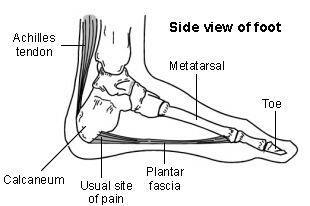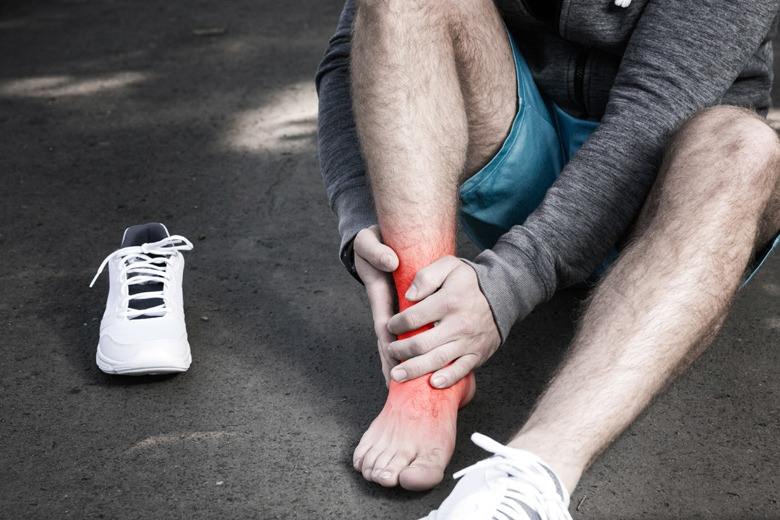I’m pretty sure no one wants to feel as if they’re suddenly 40 years older because of their feet hurting, right? I’ve once tried that before, every morning it would be the same pain I’d get coming from the sole of my feet – hobbling off of my bed doesn’t look good.
Like any other person, I just ignored the feeling of discomfort. Until it became a regular uneasiness. So, I asked myself, “Why do my feet hurt in the morning?” and apparently the answers weren’t pretty.
If you’re experiencing strain every time you walk, chances are you have plantar fasciitis.
More...
What Is Plantar Fasciitis?

Via: http://patient.info
Before you start freaking out, don’t worry – it’s actually pretty common for adults. This is what causes the pain on your heel. Journal of Multidisciplinary Healthcare even referred this as “first-step pain."
This happens because we continuously use our feet to walk, run, play, and sometimes we even abuse our feet by forcing them into uncomfortable shoes.
You’ll notice that its appearance is a rather thick tissue with lengthy fibers. It’s situated starting from the heel bone creeping towards beneath the surface of your toes.
Connectively, it has an important role in our equilibrium as it functions to aid the body’s weight when we’re walking.
However, you don’t have to worry as this does not last throughout the day. The pain will slowly subside when you gradually take a few more steps in the morning as stated by Mayo Clinic.
What Causes It?

This happens because we continuously use our feet to walk, run, play, and sometimes we even abuse our feet by forcing them into uncomfortable shoes. Before you conclude that our feet are sensitive, that’s not it.
It only occurs when you continuously strain your ligaments which will cause it to tear. If treatment is not done right away, it will eventually lead to pain and swelling.
Here are things you should be careful of:
- If your daily activities include running, walking, and standing on rough surfaces
- Forcing yourself to wear shoes that are already worn out or it’s the wrong size for your feet
- When the weight of your body tends to stay inwardly on the sole of your foot
- Your structure has high arches or flat feet
- You’re overweight
- Achilles' tendons are too tight for your own good
How Do You Treat It?

I don’t want to jump off the barrel and say that these treatments are ideal for everyone. Since there are different ways, it also means that it varies from person to person.
However, if these do not work, it’s better to consult your medical doctor right away. They’re going to provide splints for you to wear or doses of steroids.
A doctor’s visit should only be done if there’s no improvement after being treated for 6-12 months, this has been stated by EMedicineHealth.
Take a break
No matter how important your job may be – your health is always a priority. Avoid from engaging any activities which will require you to walk on hard surfaces.
Grab an ice
You’re most likely going to experience pain and swelling in the long-run, when this happens immediately grab an ice and put it on your heel or where you think the pain is originating from. This works to avoid worsening the situation.If you want to go for over-the-counter medication, you may use aspirin, ibuprofen, and naproxen– these are good pain relievers.
Do stretches
The first thing you should do every morning is to stretch – toe stretches, calf stretches, and towel stretches. You also have to stretch your body from time to time throughout the day as well.
Choose the right shoes
People often sacrifice comfort for fashion, don't follow the trend. Once you've tried on the shoes and you feel that your feet are being compromised right off the bat, put it back on the shelf.What you need is a shoe that features a good arch support, an ideal footwear should have a cushioned sole as it makes walking comfortable.
How Long Will You Experience Pain?
Unfortunately, it’s going to take a bit more time than expected. Remember, Plantar Fasciitis doesn't happen overnight. It's the result of the continuously straining your feet.
If you follow your treatments properly, you’ll be able to reduce its discomfort within a few weeks.
However, even with appropriate treatments, it’s going to take months to eliminate the pain completely. In some cases, it might go on for a year.
But if you want a quick fix, here’s a nifty YouTube video to follow.
Prevention
You know what they say, “Prevention is better than cure.” If you haven’t experienced it yet, or you want to prevent it from happening again, here are simple ways to avoid it.
Changing your eating habits
If you’re eating way too much junk food, sodas, and other unhealthy processed food, you better quit those now.
Ideally, your diet should contain vegetables, salads, protein, and food with healthy fats. Just make sure that you’re getting enough omega-3 in your system as it has an anti-inflammatory effect.
Glutathione
This is an amazing substance to fight off free radicals in our body. It has the purpose of protecting our body from wearing out making it one of the best anti-inflammatory material that our body naturally produces.
However, since our bodies differ from one system to another, there are people who can’t produce sufficient building blocks for glutathione.
In order to receive the help your body needs, get enough amino acids glycine and cysteine for your body. You may find these present in red meat, seafood, poultry, and eggs.
Allergic reaction
Make sure you’re only eating foods which you aren’t allergic to. If you continuously do so, it will penetrate to your immune system and make it evidently weaker. This may cause elevated inflammation.
In this case, things will get a little bit complicated as you will have to seek professional help from a naturopath to safely find a remedy.
Drawing a Conclusion
From what you can tell, it isn’t life-threatening. But it’s able to affect your performance in executing from your day-to-day tasks.
If you follow the steps in preventing and treating Plantar Fasciitis, it’ll reduce the pain faster than just leaving it be.
Remember, you can always take over-the-counter medications as your pain reliever – from my own experience, aspirin works best.
If you have any questions, make sure to leave one in the comment section. We will help you with it as soon as possible!
Here’s a recap on what you should do:
- Confirm if it's Plantar Fasciitis
- Don’t force yourself to walk on hard surfaces
- Treat it with ice
- Find a comfortable shoe
- Change your diet
Leave a Reply